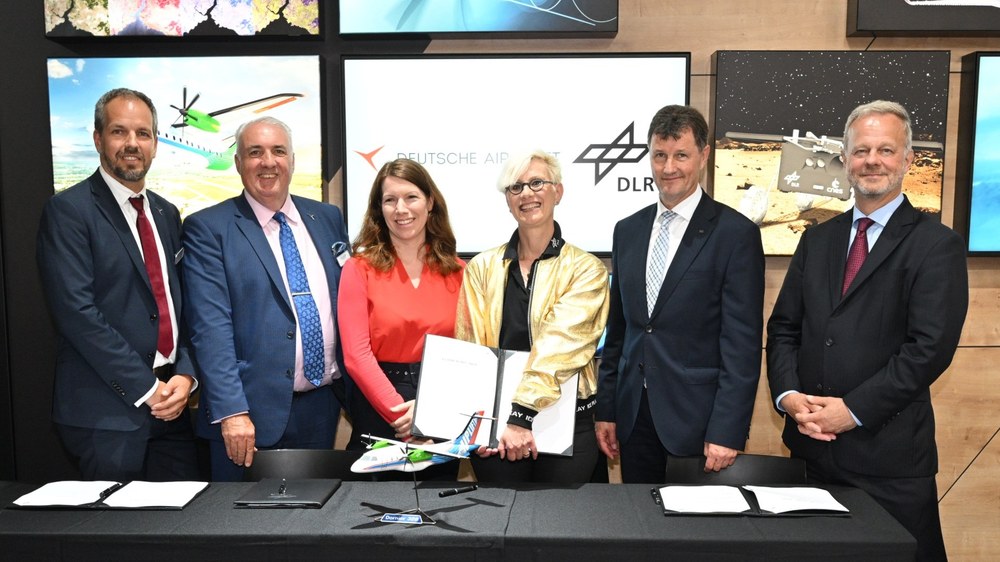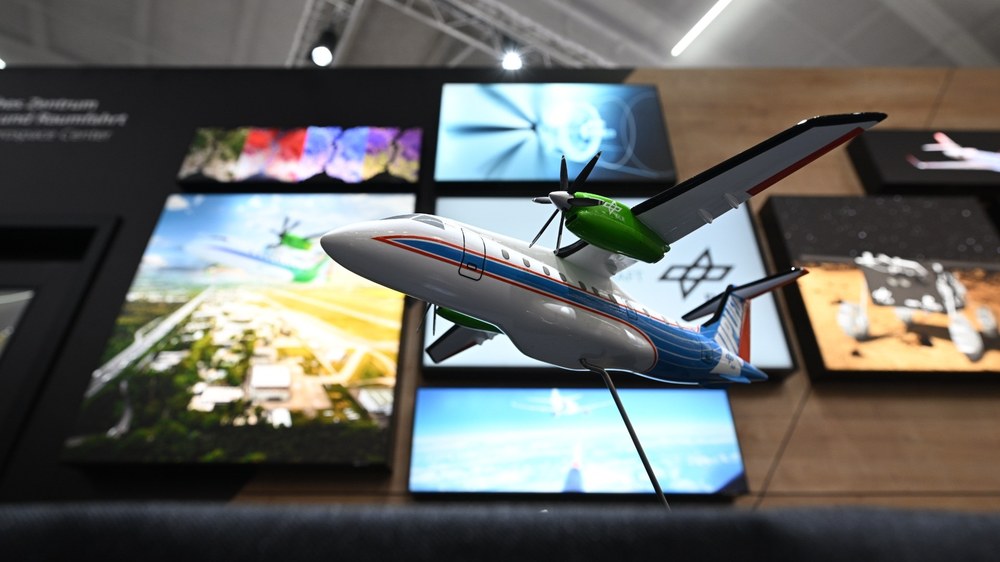An aircraft will become a 'flying hydrogen laboratory'


- A Dornier 328-100 Model 20 is being converted into a 'flying testbed' for disruptive hydrogen technologies as part of the UpLift project.
- UpLift plans to test promising propulsion, fuel and system technologies for the decarbonisation of air transport under real flight conditions.
- The new research aircraft will be stationed at DLR's Braunschweig site.
- Focus: Aeronautics, climate-friendly flight
On 20 June 2023, the German Aerospace Center (Deutsches Zentrum für Luft- und Raumfahrt; DLR) and Deutsche Aircraft signed a contract at the Paris Air Show in Le Bourget for the acquisition of a Dornier 328-100 Model 20. The contract includes the purchase of the aircraft and its gradual conversion into a research aircraft. The acquisition, conversion and use as a 'flying testbed' for research into hydrogen technologies in air transport is part of the UpLift project. The conversion of the D328, a classic regional aircraft, into a flying testbed is another bridge from research to a practical application for climate-friendly flight.
Next step on the way to a flying hydrogen test laboratory
Anna Christmann, the Federal Government Coordinator of German Aerospace Policy, emphasised: "We must invest today in the technologies that will enable us to be more climate-friendly tomorrow. What seems far away today can only come closer if we actually test new technologies. In May 2023, we launched the Flying Testbed project in the LuFo Klima aeronautics research programme to significantly accelerate the development of climate-neutral hydrogen technologies. Today, the purchase contract is being concluded for the acquisition of a regional aircraft that will serve as a hydrogen testbed in the future. Following a public invitation to tender by DLR, Deutsche Aircraft has been awarded the contract for the Dornier 328-100 Model 20. I congratulate the contracting parties on this milestone and on implementing our funding decision in record time. With the Flying Testbed, we are once again making good progress in the practical testing of disruptive hydrogen technologies and are one step closer to the common goal of climate neutrality in air transport."
Anke Kaysser-Pyzalla, Chair of the DLR Executive Board, said: “The new D328 UpLift research aircraft will perfectly complement DLR's research fleet as a flying test laboratory for hydrogen technologies and pave the way for a new, climate-friendly generation of aircraft in the regional class. This new fleet member gives DLR, together and in close partnership with the aeronautics industry, the aviation industry as well as SMEs and start-ups, the opportunity to test disruptive approaches in the development of new propulsion systems including hybrid-electric concepts based on hydrogen technologies and novel fuels up to the flight test stage."
The new flying test laboratory will be part of the DLR research fleet and will be stationed at the Braunschweig site. It will be available for as many interested partners as possible due to its modular design – especially SMEs and start-ups without their own facilities for flight testing. In this way, promising propulsion, fuel and system technologies for the decarbonisation of air transport can be tested quickly and under real flight conditions in order to significantly accelerate their development.
DLR is acting as project leader for UpLift. Deutsche Aircraft is a project partner and is contributing its expertise as an aircraft manufacturer. The funding for the years 2023 to 2025 is part of the Federal Ministry for Economic Affairs and Climate Action (Bundesministerium für Wirtschaft und Klimaschutz; BMWK) aeronautics research programme 'LuFo Klima', the central instrument with which the German government supports the aviation industry on its way towards carbon dioxide neutrality and climate compatibility.
Jasmin Eberharter, Head of Research and Technology Programs at Deutsche Aircraft, emphasised: "The critical path to climate-neutral flight is a joint effort by the entire air transport ecosystem. UpLift will give aeronautics experts will have the opportunity to combine the strengths of scientific research and industry to further contribute to and accelerate sustainable aviation."
About Dornier 328-100 Mod. 20
The D328, a member of the EASA large aircraft class ('CS-25'), is the ideal platform for testing new components and systems. This is because of the wide and tall cabin, which leaves room for the installation of various technical components. In addition, the D328 as a turboprop offers the possibility to reach flight altitudes of 30,000 feet. The overall high performance and robustness of the aircraft, the upgradeable flight deck and, last but not least, the possibility of testing Sustainable Aviation Fuels (SAFs) and, in the future, hydrogen or other sustainable energy sources in flight, make the D328 the perfect tool for the research project.
